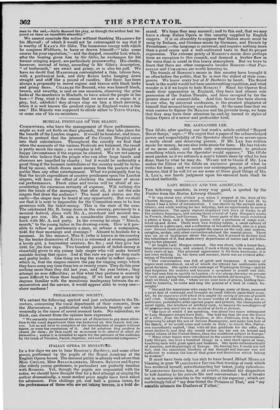LADY MORGAN AND THE AMERICANS.
THE following anecdote, in every way good, is quoted by the Yankee from the Boston Literary Gazette.
" It was about two o'clock p.m. when I stopped at the door of Sir Charles Morgan, Kildare-street, Dublin. I inquired for Lady M. to
whom I had a letter of introduction. I was shown by the servant into a library, and while waiting for her ladyship, had an opportunity to survey the apartment. The upper regions displayed rich rows of books, in all the modern languages, and among them several of Lady Morgan's works in French, Italian, and German. The lower parts of the room exhibited a piano, a harp, and a Spanish guitar, with a profusion of songs scat- tered up and down. There were two writing-tables, a small cabinet of minerals in a glass case, and a collection of beautiful shells, also in a glass case. Several small pictures occupied the spaces on the wall, and cameos, intaglios, medals, and other curiosities adorned the mantel-piece. There was an air of 'negligence about the room, but it seemed to declare that the inhabitant of it, had made every department of nature and art tribu- tary to her pleasure.
" At length Lady Morgan entered. She was short, with a broad face, blue inexpressive eyes, and seemed, if such a thing may be named, about forty years of age. Her personal appearance is far from handsome, it is not even striking. In her dress and manner, there was an evident affec • tation of Parisian taste.
" Her conversation was full of spirit and frankness. A variety of topics were introduced, on all of which she uttered her sentiments with great decision. She spoke with contempt of Washington Irving—said he had forgotten his country and become a sycophant to wealth and title. She had seen him in society in London ; he was always fawning on persons of rank, and paying fulsome compliments to foolish old dowagers. ` What shall we think,' said she, when we see your men of genius, bidding fare- well to America, to come and sing the praises of a land of rotten bo- roughs' " She said the Americans who came to Europe, many of them, incurred a great deal of contempt, and brought no small ridicule upon their coun- try, by the eagerness with which they sought the society of persons of wealth and rank. Nothing indeed can be more worthy of ridicule, than for re- publicans, protestants alike against popes and princes, the champions of equal rights, the levellers of artificial rank, to become the worshippers of tia se whose only merit lies in the accident of birth or fortune.
"The time of which I am speaking, was about two years subsequent to Lady Morgan's return from Italy. She told me that she was the bearer of a letter, from the Princess Borghese, to Mrs. Patterson, then in Paris, proposing to adopt the son of Jerome Buonaparte, arid make him heir of the family, if he would come and reside in Italy ; to which Mrs. Patter- son immediately replied, that with all due gratitude for the offer, she must decline it, and that she would rather see her son an honest and useful citizen of the United States, than the wealthiest subject in Europe.'
" Many other topics were introduced in the course of the conversation. Lady Morgan ran over a hundred things in a very short space of time, touching each with great spirit and boldness. She spoke enthusiastically of America, and despairingly of Europe. On leaving her, I could not but feel, that the masculine freedom of her thought and manner was not sufficient to redeem the loss of that grace and discretion which belong to women."
It must have been only too rich to have heard Milacli MORGAN blaming in poor WASHINGTON IRVING that worship of rank which has rendered herself, notwithstanding her talent, justly ridiculous. WASHINGTON IRVING has, at all events, confined his disposition to tuft-hunting to his private life and conversation ; but it breaks out in nauseous blotches in the writings of his, reprover ; which are surfeitingly full of " my dear friend the Princess of That," and " my amiable intimate the Duchess of T'other.",


















 Previous page
Previous page